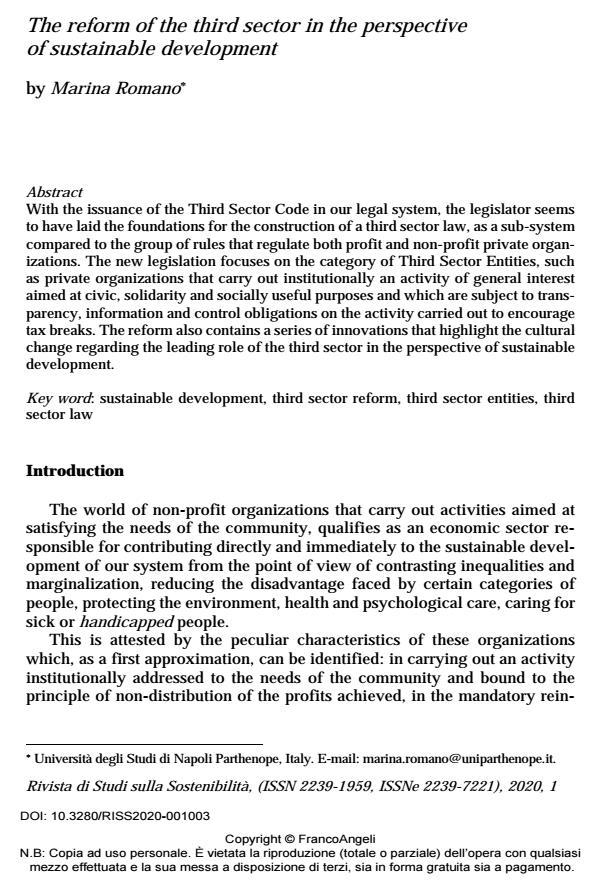The reform of the third sector in the perspective of sustainable development
Journal title RIVISTA DI STUDI SULLA SOSTENIBILITA'
Author/s Marina Romano
Publishing Year 2020 Issue 2020/1
Language English Pages 17 P. 29-45 File size 106 KB
DOI 10.3280/RISS2020-001003
DOI is like a bar code for intellectual property: to have more infomation
click here
Below, you can see the article first page
If you want to buy this article in PDF format, you can do it, following the instructions to buy download credits

FrancoAngeli is member of Publishers International Linking Association, Inc (PILA), a not-for-profit association which run the CrossRef service enabling links to and from online scholarly content.
With the issuance of the Third Sector Code in our legal system, the legislator seems to have laid the foundations for the construction of a third sector law, as a sub-system compared to the group of rules that regulate both profit and non-profit pri-vate organizations. The new legislation focuses on the category of Third Sector En-tities, such as private organizations that carry out institutionally an activity of ge-neral interest aimed at civic, solidarity and socially useful purposes and which are subject to transparency, information and control obligations on the activity carried out to encourage tax breaks. The reform also contains a series of innovations that highlight the cultural change regarding the leading role of the third sector in the per-spective of sustainable development.
Keywords: Sustainable development, third sector reform, third sector entities, third sector law
- Ambrosini M. (2000). Le radici dell’altruismo. Basi sociali e peculiarità organizzative dei soggetti del Terzo Settore. Sociologia e Politiche Sociali.
- Boni L. (2017). Codice del terzo settore: un’occasione mancata? -- www.dirittoe giustizia.it.
- Buquicchio M. (2013). Le fondazioni nell’attuale assetto economico e giuridico del “terzo settore”. Riv. not.
- Cerrato S. (2016). Origami giuridici: il fallimento delle fondazioni. Giur. it., 1: 128 ss.
- Costi R. (1968). Fondazione e impresa. Riv. dir. civ., I.
- De Giorgi M.V. (2017). Autorità e libertà nella riforma del Terzo settore. Non Profit, 3.
- Fici A. (2018). Introduzione. In: Fici A. (a cura di). La riforma del terzo settore e dell’impresa sociale. Editoriale Scientifica, Napoli.
- Gori L., Rossi E. (2016). La legge delega n. 106 del 2016 di riforma del terzo settore. -- www.osservatoriosullefonti.it.
- Gori L. (2018). Il sistema delle fonti nel diritto del terzo settore. -- www.osservatorio dellefonti.it.
- Lori M., Pavolini E. (2016). Cambiamenti organizzativi e ruolo societario delle organizzazioni di Terzo Settore. Politiche Sociali.
- Mazzullo A. (2017). Il nuovo codice del terzo settore. Giappichelli, Torino.
- Novarino M., Marocchi G. (2017). La riforma del terzo settore alla prova dei decreti attuativi. Welfare oggi, 4.
- Nuzzo M. (a cura di) (2014). Il principio di sussidiarietà nel diritto privato. Giappichelli, Torino.
- Pacini F. (2017). L’impianto del Codice del Terzo settore. Non Profit, 3.
- Ponzanelli G. (2017). Enti del terzo settore: un primo commento. In: AA.VV. La riforma del c.d. Terzo settore e l’imposizione fiscale delle liberalità indirette. I Quaderni della Fondazione Italiana del Notariato, 2.
- Ponzanelli G. (2017). Terzo settore: la legge delega di riforma. La Nuova giur. civ. comm.
- Propersi A. (2017). L’ibridizzazione della normativa e dei comportamenti nelle aziende profit e non profit. Non Profit, 3.
- Rescigno G.U. (2002). Principio di sussidiarietà orizzontale e diritti sociali. Dir. pubbl.
- Rossi E., Gori L. (2017). La riforma del Terzo settore: fra libertà, pubblica amministrazione e agevolazioni. Non Profit, 3.
- Rossi E. (2017). Il rompicapo dei controlli sugli enti del Terzo settore. Non Profit, 3.
- Scalisi V. (1993). Le fondazioni: A) il negozio di fondazione. La distinzione tra associazioni e fondazioni e l’abuso della personalità giuridica. In: Casi e questioni di Diritto Privato, diretto da M. Bessone, I.
- Tondi della Mura V. (2017). Riforma del Terzo settore. Non Profit, 3.
- Vivaldi E. (2017). Il Registro unico del Terzo settore. Non Profit, 3.
- Zoppini A. (1995). Le fondazioni. Dalla tipicità alle tipologie. Napoli: Jovene.
Marina Romano, The reform of the third sector in the perspective of sustainable development in "RIVISTA DI STUDI SULLA SOSTENIBILITA'" 1/2020, pp 29-45, DOI: 10.3280/RISS2020-001003